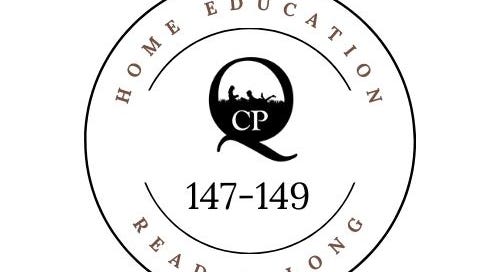CPQ Read-A-Long Home Education (pp. 147-149)
I.—THE HABIT OF ATTENTION (cont.)
I.—THE HABIT OF ATTENTION (cont.)
The Schoolboy’s Home Work.—In the matter of home work, the parents may still be of great use to their boys and girls after they begin to go to day-school; not in helping them, that should not be necessary; but let us suppose a case:—‘Poor Annie does not finish her lessons till half-past nine, she really has so much to do’; ‘Poor Tom is at his books till ten o’clock; we never see anything of the children in the evening,’ say the distressed parents; and they let their children go on in a course which is absolutely ruinous both to bodily health and brain power.
Wholesome Home Treatment for Mooning.—Now, the fault is very seldom in the lessons, but in the children; they moon over their books, and a little wholesome home treatment should cure them of that ailment. Allow them, at the utmost, an hour and a half for their home-work; treat them tacitly as defaulters if they do not appear at the end of that time; do not be betrayed into word or look of sympathy; and the moment the time for lessons is over, let some delightful game or story-book be begun in the drawing-room. By-and-by they will find that it is possible to finish lessons in time to secure a pleasant evening afterwards, and the lessons will be much the better done for the fact that concentrated attention has been bestowed on them. At the same time the custom of giving home-work, at any rate to children under fourteen, is greatly to be deprecated. The gain of a combination of home and school life is lost to the [p 148] children; and a very full scheme of school work may be carried through in the morning hours.
Rewards and Punishments should be relative Consequences of Conduct.—In considering the means of securing attention, it has been necessary to refer to discipline—the dealing out of rewards and punishments,—a subject which every tyro of a nursemaid or nursery governess feels herself very competent to handle. But this, too, has its scientific aspect: there is a law by which all rewards and punishments should be regulated: they should be the natural, or, at any rate, the relative consequences of conduct; should imitate, as nearly as may be without injury to the child, the treatment which such and such conduct deserves and receives in after life. Miss Edgeworth, in her story of Rosamond and the Purple Jar, hits the right principle, though the incident is rather extravagant. Little girls do not often pine for purple jars in chemists’ windows; but that we should suffer for our wilfulness in getting what is unnecessary by doing without what is necessary, is precisely one of the lessons of life we all have to learn, and therefore is the right sort of lesson to teach a child.
Natural and Educative Consequences.—It is evident that to administer rewards and punishments on this principle requires patient consideration and steady determination on the mother’s part. She must consider with herself what fault of disposition the child’s misbehaviour springs from; she must aim her punishment at that fault, and must brace herself to see her child suffer present loss for his lasting gain. Indeed, exceedingly little actual punishment is necessary where children are brought up with care. But this happens continually—the child who has done [p 149] well gains some natural reward (like that ten minutes in the garden), which the child forfeits who has done less well; and the mother must brace herself and her child to bear this loss; if she equalise the two children she commits a serious wrong, not against the child who has done well, but against the defaulter, whom she deliberately encourages to repeat his shortcoming. In placing her child under the discipline of consequences, the mother must use much tact and discretion. In many cases, the natural consequence of the child’s fault is precisely that which it is her business to avert, while, at the same time, she looks about for some consequence related to the fault which shall have an educative bearing on the child: for instance, if a boy neglect his studies, the natural consequence is that he remains ignorant; but to allow him to do so would be criminal neglect on the part of the parent.
Are you following along with us? Grab the reading tracker bookmark!
You will find an appendix with questions in the back of Home Education. These questions were for the students or persons preparing to become “Qualified Members” of the Parents’ National Educational Union. We put these questions on paper for you to use, if you’d like, as you ponder Mason’s writings. A new one will be available every Monday.
Thank you to the team at Charlotte Mason Poetry for making the digital text of Charlotte Mason’s volumes available for all to use.




